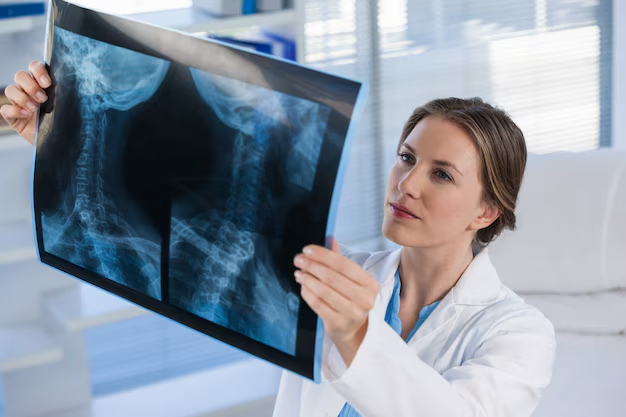Your Guide to How Do I Know If I Have Osteoporosis
What You Get:
Free Guide
Free, helpful information about Osteoporosis FAQ and related How Do I Know If I Have Osteoporosis topics.
Helpful Information
Get clear and easy-to-understand details about How Do I Know If I Have Osteoporosis topics and resources.
Personalized Offers
Answer a few optional questions to receive offers or information related to Osteoporosis FAQ. The survey is optional and not required to access your free guide.
Are You at Risk for Osteoporosis? Here's How to Know
Osteoporosis is often referred to as the "silent disease" due to its stealthy nature and rarity of symptoms—especially in its early stages. It's a condition characterized by weakened bones and an increased risk of fractures. As it progresses, you might not even notice anything is amiss until a sudden break occurs from a minor fall, or even a simple movement. But how can you know if you have osteoporosis before it reaches this critical point?
Recognizing the Signs
While osteoporosis can be asymptomatic early on, there are some signs and symptoms that could hint at its presence:
- Back Pain: This may occur due to a fractured or collapsed vertebra.
- Loss of Height Over Time: You might notice you're not standing as tall as you used to.
- Stooped Posture: This often happens later as the spine is affected.
- Bone Fractures: Especially when they occur more easily than expected, these can be a telltale sign.
Getting Diagnosed
The most reliable way to determine if you have osteoporosis is through a bone density test, commonly known as a DEXA scan. This painless procedure measures bone mineral density (BMD) and compares it to the standard BMD of a young adult of the same gender. Your doctor can provide more detailed information on whether you need this test and how frequently it should be done.
Who Should Be Tested?
Certain groups are at a higher risk for osteoporosis and should consider regular bone density testing:
- Women aged 65 and older
- Postmenopausal women younger than 65 with risk factors
- Men aged 70 and older
- Adults over 50 who have experienced a fracture
- Individuals with medical conditions or taking medications that can lead to bone density loss
Prevention and Management
If you're diagnosed with osteoporosis, or if you're at risk, taking proactive steps can help manage the condition or delay its onset. Consider the following strategies:
- Nutrition: A diet rich in calcium and vitamin D is crucial. Dairy products, leafy greens, and fortified foods are excellent sources.
- Exercise: Weight-bearing and muscle-strengthening exercises build bone strength.
- Lifestyle Changes: Avoid smoking and excessive alcohol consumption.
Managing osteoporosis often involves these lifestyle modifications, alongside medication prescribed by healthcare providers to strengthen bones and prevent fragility fractures.
Navigating Financial Resources
Dealing with osteoporosis or just the concern of having it requires keeping an eye on medical expenses. Fortunately, there are several avenues for financial assistance that can ease the burden of diagnosis and treatment:
- 👉 Government Programs: Medicare typically covers bone density tests for at-risk individuals. Investigate if you qualify for Medicaid or other state-sponsored health programs.
- 💳 Credit Options: Consider health credit cards designed to help spread out medical expenses over time.
- 📚 Educational Grants: Universities and non-profits offer seminars and workshops for living with osteoporosis, often free of charge or subsidized.
- 🏥 Hospital Assistance Programs: Many hospitals provide services on a sliding scale or offer assistance programs for those with financial hardships.
Taking action towards understanding your health—and particularly, understanding osteoporosis—enables you to better manage your situation. By keeping informed, leveraging available resources, and following medical guidance, you set the stage for greater health resilience and peace of mind.
What You Get:
Free Osteoporosis FAQ Guide
Free, helpful information about How Do I Know If I Have Osteoporosis and related resources.

Helpful Information
Get clear, easy-to-understand details about How Do I Know If I Have Osteoporosis topics.

Optional Personalized Offers
Answer a few optional questions to see offers or information related to Osteoporosis FAQ. Participation is not required to get your free guide.


Discover More
- a Nurse Is Caring For a Client Who Has Osteoporosis.
- a Percutaneous Is Performed To Treat Osteoporosis Related Compression Fractures
- Can Alcohol Cause Osteoporosis
- Can I Do Pilates If I Have Osteoporosis
- Can I Reverse Osteoporosis
- Can Men Get Osteoporosis
- Can Osteoporosis Affect Teeth
- Can Osteoporosis Be Cured
- Can Osteoporosis Be Painful
- Can Osteoporosis Be Reversed
